| Listing 1 - 10 of 88 | << page >> |
Sort by
|
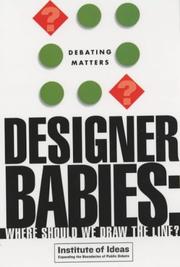

ISBN: 0340848359 Year: 2007 Publisher: London Hodder and Stoughton
Abstract | Keywords | Export | Availability | Bookmark
 Loading...
Loading...Choose an application
- Reference Manager
- EndNote
- RefWorks (Direct export to RefWorks)
Science fiction has been preoccupied with technologies to control the characteristics of our children since the publication of Aldous Huxley's "Brave New World". Current arguments about "designer babies" almost always demand that lines should be drawn and regulations tightened. But where should regulation stop and patient choice in the use of reproductive technology begin? In this book, five contributors set out their arguments. In this text, contrasting approaches to this topical and contentious question are presented by various specialists on the subject. The Institute of Idea's mission is to expand the boundaries of public debate through organizing conferences, discussions and salons, and publishing written conversations and exchanges in a hope to play a part in shaking up a culture that seems to shy away more and more from confrontation and the clash of ideas. This series aims to present thought-provoking arguments.
designerbaby (redderbaby) --- reproductieve technologie (voortplantingstechnologie, medisch begeleide voortplanting, MBV, artificiële voortplanting, kunstmatige voortplanting) --- enfant médicaments --- technique de reproduction (technique de procréation, procréation médicalement assistée, PMA, procréation artificielle)
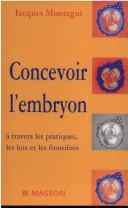
ISBN: 2294003535 9782294003530 Year: 2000 Publisher: Paris Masson
Abstract | Keywords | Export | Availability | Bookmark
 Loading...
Loading...Choose an application
- Reference Manager
- EndNote
- RefWorks (Direct export to RefWorks)
Transmettre la vie est un acte d'amour, d'altérité et de responsabilité. Les avancées notamment de la biologie et de la génétique ont, ces dernières années, ouvert de nouvelles perspectives aux pratiques d'assistance médicale à la procréation. La France compte parmi les premiers pays qui se sont dotés d'un cadre légal, après avoir institué une réflexion pluraliste en matière de bioéthique. Confronter les lois et les pratiques dans les différents pays d'Europe et dans le monde met en relief la variété des approches culturelles, mais aussi personnelles, face aux questions touchant au couple, à l'enfant, au respect de la vie. La loi française de bioéthique de 1994 portant sur l'assistance médicale à la procréation sera prochainement réexaminée. Plus que jamais, une information de qualité doit nourrir un débat pluridisciplinaire, responsable, citoyen, puisqu'il engage de véritables choix de société : outre les nombreux acteurs impliqués, chacun de nous est donc, par principe, partie prenante d'une telle information et des réflexions qu'elle suscite. C'est dans cet esprit de clarté que l'auteur propose ici ce large " état des lieux " qui, au-delà même de cette échéance, éclaire la dimension scientifique, sociale et humaine de chaque question en regard des réponses, parfois contradictoires, apportées à ce jour par les différents pays.
reproductieve technologie (voortplantingstechnologie, medisch begeleide voortplanting, MBV, artificiële voortplanting, kunstmatige voortplanting) --- technique de reproduction (technique de procréation, procréation médicalement assistée, PMA, assistance médicale à la procréation, AMP, procréation artificielle)
Book
ISBN: 9782868204691 2868204694 Year: 2011 Volume: [3] Publisher: Strasbourg Presses universitaires de Strasbourg
Abstract | Keywords | Export | Availability | Bookmark
 Loading...
Loading...Choose an application
- Reference Manager
- EndNote
- RefWorks (Direct export to RefWorks)
Voilà plus de 30 ans que l'on congèle sperme, ovocytes, embryons humains. Des CECOS (Centre d'études et de conservation des oeufs et du sperme humain) ont été créés pour cela. Leur mise en place, leurs questionnements éthiques, les valeurs qu'ils veulent ou non promouvoir (gratuité, anonymat), illustrent le fort impact de la médicalisation de notre société. Les gamètes détachés du corps permettent d'espérer une paternité/maternité ultérieure, et en cas de cancer un tel espoir peut contribuer à la volonté de guérir, mais suscitent également des fantasmes de maîtrise, voire d'immortalité. L'ouvrage donne la parole aux acteurs de la première génération de CECOS et prend acte des grands défis issus de ces mutations de la société au contact des biotechnologies.
reproductieve technologie (voortplantingstechnologie, medisch begeleide voortplanting, MBV, artificiële voortplanting, kunstmatige voortplanting) --- spermadonatie (spermadonor) --- technique de reproduction (technique de procréation, procréation médicalement assistée, PMA, procréation artificielle) --- don de sperme (donneur de sperme)
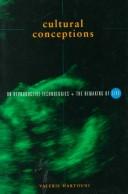
ISBN: 0816626235 0816626227 Year: 1997 Publisher: Minneapolis University of Minnesota press
Abstract | Keywords | Export | Availability | Bookmark
 Loading...
Loading...Choose an application
- Reference Manager
- EndNote
- RefWorks (Direct export to RefWorks)
reproductieve technologie (voortplantingstechnologie, medisch begeleide voortplanting, MBV, artificiële voortplanting, kunstmatige voortplanting) --- technique de reproduction (technique de procréation, procréation médicalement assistée, PMA, procréation artificielle) --- Human reproductive technology --- Moral and ethical aspects --- Social aspects
Book
ISBN: 2738106501 9782738106506 Year: 1998 Publisher: Paris Odile Jacob
Abstract | Keywords | Export | Availability | Bookmark
 Loading...
Loading...Choose an application
- Reference Manager
- EndNote
- RefWorks (Direct export to RefWorks)
La naissance de Louise Brown en Angleterre en 1978, puis celle d'Amandine en France ont représenté pour des millions de couples stériles un symbole d'espoir. Pouvait-on imaginer que vingt ans après on serait en mesure de sélectionner en éprouvette les embryons porteurs de maladies génétiques, que des ovules se négocieraient sur le Web et qu'on envisagerait la possibilité du clonage humain?Dans l'histoire de ces dernières années, la procréation médicalement assistée constitue une évolution aussi importante que la maîtrise de la fécondalité par la contraception. Elle induit en tout cas nombre d'interrogations sur la famille, la sexualité, la filiation. Faire le point des avancées techniques, mais surtout des questions psychologiques, sociales, éthiques qu'elles posent ; dresser un état des lieux des polémiques qui traversent le débat public : tels sont les but de cet ouvrage qui regroupe les contributions des meilleurs spécialistes français, venus de multiples disciplines.
reproductieve technologie (voortplantingstechnologie, medisch begeleide voortplanting, MBV, artificiële voortplanting, kunstmatige voortplanting) --- technique de reproduction (technique de procréation, procréation médicalement assistée, PMA, assistance médicale à la procréation, AMP, procréation artificielle)
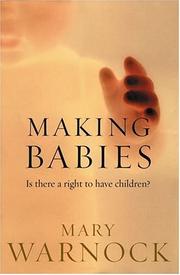
ISBN: 0192803344 0192805002 9780192803344 Year: 2002 Publisher: Oxford Oxford university press
Abstract | Keywords | Export | Availability | Bookmark
 Loading...
Loading...Choose an application
- Reference Manager
- EndNote
- RefWorks (Direct export to RefWorks)
Mary Warnock studies the issues underlying reproductive technologies. She analyses what it means to claim something as a 'right' and discusses the cases of different groups of people. She examines the ethical problems faced by types of assisted reproduction and argues that human cloning may be a viable form of treatment for infertility. The development of new reproductive technologies has raised urgent questions and debates about how and by whom these treatments should be controlled. On the one hand individuals and groups have claimed access to assisted reproduction as a right, and some have also claimed that this access should be available free of charge. As well as clinically infertile heterosexual couples, this right has been claimed by single women, gay couples, post-menopausal women, and couples who wish to delay having children for various reasons. Others have argued that a desire to have children does not make it a human right, and, moreover, that there are some people who should not be assisted to become parents, on grounds of age, sexuality, or lifestyle. Mary Warnock steers a clear path through the web of complex issues underlying these views. She begins by analyzing what it means to claim something as a 'right', and goes on to discuss the cases of different groups of people. She also examines the ethical problems faced by particular types of assisted reproduction, including artificial insemination, in-vitro fertilization, and surrogacy, and argues that in the future human cloning may well be a viable and acceptable form of treatment for some types of infertility.
Reproductive technology --- Human reproductive technology --- Moral and ethical aspects. --- Moral and ethical aspects --- #GBIB:CBMER --- -Human reproductive technology --- -reproductieve technologie (voortplantingstechnologie, medisch begeleide voortplanting, MBV, artificiële voortplanting, kunstmatige voortplanting) --- kinderwens --- Assisted human reproduction --- Assisted conception --- Conception --- Human assisted reproduction --- Human reproduction --- Medical technology --- Assisted reproduction --- Reproduction --- Biotechnology --- technique de reproduction (technique de procréation, procréation médicalement assistée, PMA, assistance médicale à la procréation, AMP, procréation artificielle) --- désir d'enfant --- Technological innovations --- reproductieve technologie (voortplantingstechnologie, medisch begeleide voortplanting, MBV, artificiële voortplanting, kunstmatige voortplanting) --- ART (Assisted reproductive technology) --- Assisted reproductive technology --- Reproductive techniques --- Reproductive technology - Moral and ethical aspects. --- Human reproductive technology - Moral and ethical aspects. --- Human reproductive technology - Moral and ethical aspects
Book
ISBN: 9026313918 Year: 1995 Publisher: Baarn Ambo
Abstract | Keywords | Export | Availability | Bookmark
 Loading...
Loading...Choose an application
- Reference Manager
- EndNote
- RefWorks (Direct export to RefWorks)
In het eerste deel geeft hij een overzicht van de discussie rond kunstmatige bevruchting in de afgelopen decennia, te beginnen met de afwezigheid van discussie. Hierdoor zijn, volgens hem belangrijke psychologische en pedagogische aspecten buiten beeld gebleven en kon de biotechnologische benadering zich ongehinderd breed maken. Daarvan plukken we volgens hem nog altijd de wrange vruchten. Er is een vrijwel directe verbinding tussen technische mogelijkheden en de toepassing ervan. Voorzichtig schetst hij een angstig toekomstscenario, waarin selectie op individuele kenmerken, zoals geslacht, huidskleur en intelligentie, kan plaatsvinden. Hartstochtelijke pogingen om deze welhaast autonome technologische ontwikkeling te attaqueren, hebben nog weinig succes. Dit is beangstigend. Straks schept de mens zichzelf, naar eigen beeld en ideaal. Hoksbergen hekelt de dwang die van de technologie uitgaat. Hij krijgt daarin bijval van Dymphie van Berkel, universitair docent ontwikkelingspsychologie en vrouwenstudies. Zij schrijft in het tweede deel van het boek een behartenswaardige bijdrage over de vraag of prenatale diagnostiek een bevordering of juist een ondermijning is van autonomie van vrouwen. Zij signaleert een onmiskenbare dwang om voorhanden zijnde technologie in te zetten. Die dwang kan expliciet zijn, bijvoorbeeld bij uitsluiting van levensverzekering als in de familie ernstige erfelijke aandoeningen voorkomen. Meer subtiel is de dwang die in de zogenaamd objectieve voorlichting besloten ligt. In elke voorlichting ligt een boodschap, aldus Van Berkel. Elke informatie is een selectie. Verder is er onuitgesproken dwang vanuit de omgeving. Wie durft als oudere zwangere nog prenataal onderzoek te weigeren? In dit tweede deel komen meer critici aan het woord. Een van hen, Egbert Schuurman, bijzonder hoogleraar reformatorische wijsbegeerte en lid van de Eerste Kamer voor de RPF, stelt dat kritiek pas echt steekhoudend is als die wordt losgemaakt van deelproblemen en zich richt op de technologische cultuur. Harde oppositie tegen dit 'technische wapengekletter' kiest Mary Oosterdijk namens de stichting Achtste Dag, een organisatie die met het oog op een kritisch maatschappelijk debat informatie over kunstmatige bevruchting voor het publiek toegankelijk wil maken. Zij hamert vooral op het belang van de toekomstige kinderen. Consequent wordt aan die belangen hooguit marginaal aandacht besteed, stelt zij verontwaardigd vast. Dit geldt sowieso al bij de legitimatie van ivf en zeker als het gaat om vrouwen die op vijftig of 55-jarige leeftijd nog moeder willen worden. Ongelijk heeft zij niet. Ook voor de KNMG is het belang van het kind slechts zijdelings een factor. De psycho-sociale risico's voor het kind zijn waarschijnlijk niet hoog, maar strikt genomen weten we het niet, stelt de artsenorganisatie. Bij deze woorden blijft het. Want de vaststelling van de 'veilige' maximumleeftijd van 55 jaar voor de aanstaande moeder wordt, naast gebrek aan inzicht in effectiviteit en risico's boven die leeftijd, ingegeven door de mogelijkheid dat een moeder dan nog een 'gemiddelde gezonde levensverwachting heeft, die gelijk is aan de periode om een kind tot zelfstandigheid op te voeden'. Maar hiermee zijn de risico's voor het kind niet weggenomen, hooguit is aan een belangrijke voorwaarde voldaan. Het antwoord op vragen over hoe het kind zijn 'oude' moeder zal ervaren, hoe het over vijftien jaar zal reageren op de wetenschap een andere biologische moeder te hebben, en misschien ook vader, blijft onduidelijk. Juist deze onzekerheid zou tot meer voorzichtigheid moeten leiden dan zich nu aftekent. Hoe ver gaan we? biedt voldoende om het noodzakelijke maatschappelijke debat over kunstmatige bevruchting kritisch te voeren. Dat wil zeggen, op onderdelen, want de verbinding tussen de diverse bijdragen is niet sterk, waardoor een samenhangende analyse van mogelijkheden en problemen ontbreekt.
Ethics of family. Ethics of sexuality --- #gsdb5 --- #GBIB:CBMER --- reproductieve technologie (voortplantingstechnologie, medisch begeleide voortplanting, MBV, artificiële voortplanting, kunstmatige voortplanting) --- technique de reproduction (technique de procréation, procréation médicalement assistée, PMA, assistance médicale à la procréation, AMP, procréation artificielle) --- Human reproduction --- Moral and ethical aspects --- Human reproductive technology --- Gezinsethiek. Seksuele ethiek --- Ethics --- Genetic manipulation --- Medical ethics --- Reproductive technology --- Biotechnology --- Book
Book
ISBN: 2742001530 2930088427 9782742001538 9782930088426 Year: 1996 Volume: *2 Publisher: Bruxelles Montrouge Pire [Luc] John Libbey Eurotext
Abstract | Keywords | Export | Availability | Bookmark
 Loading...
Loading...Choose an application
- Reference Manager
- EndNote
- RefWorks (Direct export to RefWorks)
Colloques --- Colloquia --- Droit de la famille --- Enfants --- Ethique philosophique --- Familierecht --- Geboorte --- Kinderen --- Naissances --- Wijsgerige ethiek --- reproductieve technologie (voortplantingstechnologie, medisch begeleide voortplanting, MBV, artificiële voortplanting, kunstmatige voortplanting) --- psychologie (psychologische aspecten) --- kinderen --- technique de reproduction (technique de procréation, procréation médicalement assistée, PMA, procréation artificielle) --- psychologie (aspects psychologiques) --- enfants --- Conferences - Meetings --- Ethics, medical --- Insurance, psychiatric --- Medical assistance --- Reproduction
Book
ISBN: 2130493033 9782130493037 Year: 1998 Volume: 1641 Publisher: Paris PUF
Abstract | Keywords | Export | Availability | Bookmark
 Loading...
Loading...Choose an application
- Reference Manager
- EndNote
- RefWorks (Direct export to RefWorks)
Paternity --- Filiation --- Law and legislation --- Droit --- Illegitimacy --- voortplanting (reproductie) --- reproductieve technologie (voortplantingstechnologie, medisch begeleide voortplanting, MBV, artificiële voortplanting, kunstmatige voortplanting) --- adoptie --- familierecht --- afstammingsrecht (afstamming) --- -Bastardy --- Legitimacy (Law) --- Parent and child (Law) --- Sex and law --- procréation (reproduction) --- technique de reproduction (technique de procréation, procréation médicalement assistée, PMA, procréation artificielle) --- adoption --- droit des familles --- droit de la filiation --- -procréation (reproduction) --- Bastardy --- Illegitimacy - France - Popular works
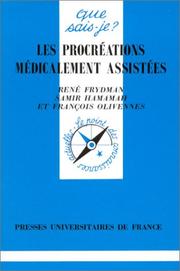
ISBN: 2130442234 9782130442233 Year: 1992 Volume: 2635 Publisher: Paris PUF
Abstract | Keywords | Export | Availability | Bookmark
 Loading...
Loading...Choose an application
- Reference Manager
- EndNote
- RefWorks (Direct export to RefWorks)
Insémination artificielle humaine --- Artificial insemination, Human. --- Insémination artificielle humaine --- 618.179 --- technique de reproduction (technique de procréation, procréation médicalement assistée, PMA, assistance médicale à la procréation, AMP, procréation artificielle) --- 173.4 --- reproductieve technologie (voortplantingstechnologie, medisch begeleide voortplanting, MBV, artificiële voortplanting, kunstmatige voortplanting) --- Artificial insemination, Human
| Listing 1 - 10 of 88 | << page >> |
Sort by
|

 Search
Search Feedback
Feedback About
About Help
Help News
News